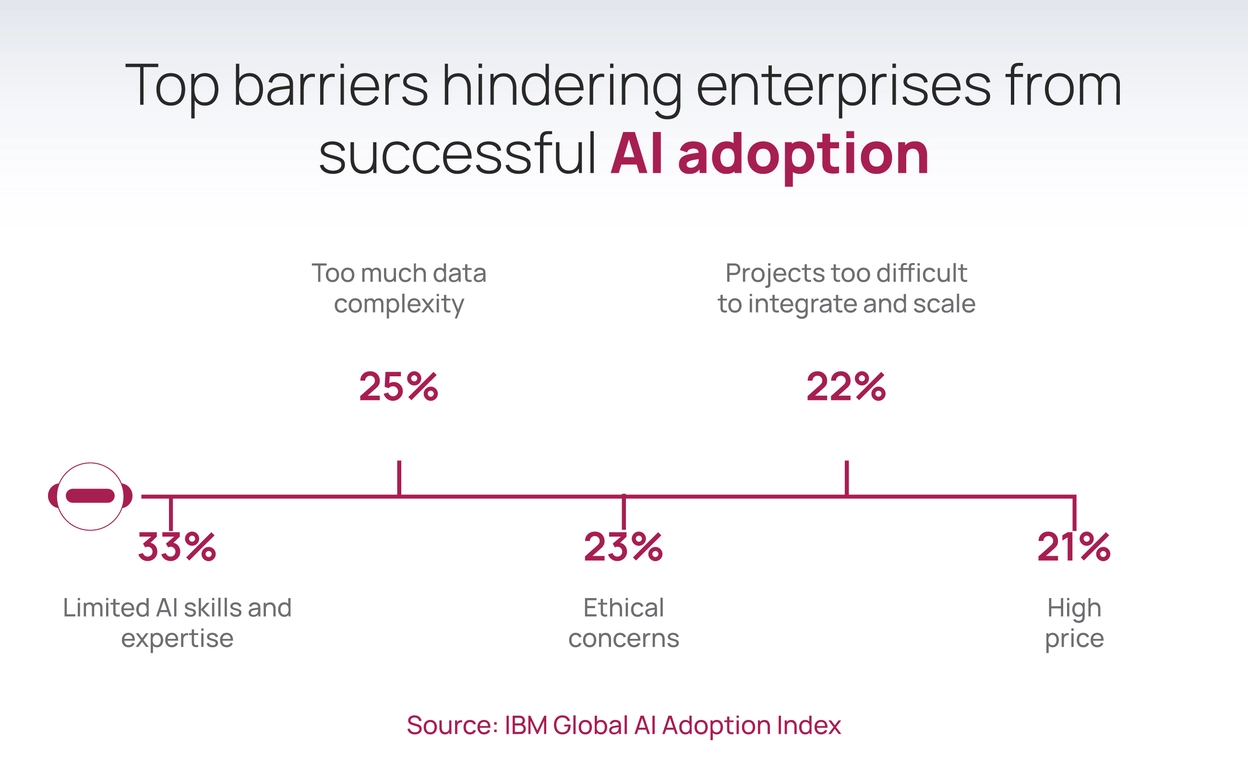A recent IBM study revealed a staggering fact: nearly half (42%) of large enterprises surveyed have already begun actively integrating Artificial Intelligence (AI) into their operations. This surge in adoption highlights the immense potential AI holds for businesses of all sizes. But what if you're a business owner or manager intrigued by AI's possibilities yet unsure where to begin?
This guide is here to bridge that gap. We understand that navigating the world of AI can feel overwhelming. This comprehensive resource will provide the knowledge and strategies to confidently embark on your AI journey, even if you're a complete beginner.
We'll walk you through the practical steps of implementing AI, from identifying areas where it can add the most value to your organization to selecting the right tools and ensuring a smooth integration process.
Let’s get started!
The Benefits of AI Integration in Business
The decision to integrate AI into your business operations shouldn't be taken lightly. However, the potential rewards are significant. Here's a glimpse into some of the key benefits you can expect to reap:
Increased Efficiency and Productivity: AI excels at automating repetitive tasks, freeing up your valuable human workforce to focus on higher-level cognitive activities. Imagine streamlining data entry, automating report generation, or optimizing logistics – AI can handle these tasks quickly and accurately, allowing your employees to dedicate their time to more strategic initiatives and creative problem-solving.
Enhanced Customer Experience: AI can be a powerful tool for personalizing the customer journey. It can analyze customer data to anticipate needs, recommend relevant products or services, and provide 24/7 chat support. By tailoring experiences to individual preferences, AI fosters deeper customer engagement, loyalty, and satisfaction.
Improved Decision Making: AI excels at processing vast amounts of data and identifying patterns that might escape human analysis. This empowers businesses to make data-driven decisions with greater confidence. AI can uncover hidden trends in customer behavior, optimize marketing strategies based on real-time insights, and predict potential risks or areas for improvement. By leveraging AI's analytical capabilities, you can gain a competitive edge and make informed choices that drive sustainable growth.
Challenges of Artificial Intelligence Business Integration
When asked about the reasons for their reluctance to deploy traditional AI, companies cited several key barriers that included limited AI skills and expertise (33%), challenges related to data complexity (25%), and ethical concerns (23%).

The case gets more complex with the use of Generative AI, with its biggest inhibitors, according to IT professionals at surveyed organizations, being Data privacy (57%) and trust and transparency (43%). According to research from Cyberhaven, a data security firm, 2.3% of employees inserted confidential company data into ChatGPT in its first three months of use, with sensitive data making up 11% of what employees paste into the Generative AI chatbot.
Let’s review these concerns:
Lack of Understanding
Navigating the world of AI can feel overwhelming, especially for businesses unfamiliar with the technology. Here are some specific aspects that can pose challenges:
Identifying the right AI solutions: With a vast array of AI tools and platforms available, pinpointing the ones that align perfectly with your unique needs can be a complex task. Understanding the different types of AI (machine learning, deep learning, etc.) and their functionalities is crucial for making informed choices.
Technical complexities: AI implementation often involves complex technical considerations. Your team might require additional training or expertise in areas like data science, machine learning algorithms, and AI model development.
Building an internal AI team: Finding and retaining skilled professionals who can manage, develop, and maintain AI systems can be a competitive challenge. Building an internal team with the necessary expertise requires strategic planning and potentially outsourcing certain aspects until your in-house capabilities mature.
Data Privacy and Security Concerns
AI is data-driven, and its effectiveness hinges on the quality and quantity of data it can analyze. However, data privacy regulations and security risks pose significant challenges:
Compliance with data privacy laws: Regulations like GDPR (General Data Protection Regulation) and CCPA (California Consumer Privacy Act) impose strict requirements on data collection, storage, and usage. Businesses must ensure their AI implementation adheres to these regulations to avoid legal ramifications.

Security vulnerabilities: As AI systems handle sensitive information, robust security measures are crucial. Protecting against data breaches, unauthorized access, and potential biases within the data itself is essential to maintain trust with customers and stakeholders.
Building trust with customers: Transparency regarding data usage is key. Businesses need to clearly communicate how customer data is being collected, used, and protected within the AI framework to build trust and mitigate potential privacy concerns.
Integration with Existing Systems
AI doesn't operate in a silo. Effectively integrating it with your existing business infrastructure can be a complex endeavor:
Legacy system compatibility: Older systems might not be readily compatible with AI technologies, requiring upgrades, data migration processes, or API integrations to enable smooth communication and data exchange.
Data standardization: Data used for AI might be stored in different formats or databases across your organization. Standardizing data formats and ensuring data quality are vital for successful AI implementation.
Change management: Implementing AI can disrupt established workflows and require process changes. Proper change management strategies are essential to ensure user adoption and minimize resistance within your organization.
These challenges shouldn't deter you from exploring AI's benefits. However, a thorough understanding of these hurdles and a well-defined strategy will significantly increase your chances of successful AI integration.
Best Practices for Integrating AI Successfully
While AI offers a powerful toolkit for business transformation, navigating the path to successful integration requires a strategic approach. Here are some key best practices to consider:

Developing a Clear Integration Strategy
Don't jump straight into AI implementation. Start by outlining a clear and well-defined strategy that aligns with your overall business goals. This strategy should encompass:
Identifying business needs: Pinpoint the specific areas where AI can add the most value to your organization. Are you aiming to streamline operations, improve customer experience, or optimize decision-making?
Setting realistic goals: Establish measurable goals for your AI implementation. What metrics will you use to track success? Defining clear objectives will guide your approach and ensure the AI solution addresses actual needs.
Defining success criteria: Determine how you'll measure the success of your AI integration. This could involve improvements in efficiency, customer satisfaction scores, or cost savings.
Choosing the Right AI Tools and Technologies
The vast array of AI solutions can be overwhelming. Careful selection is crucial for successful integration:
Understanding your data: Analyze the type and format of data you have available. Different AI tools cater to different data structures and needs.
Matching capabilities to needs: Don't be lured by the latest, fanciest AI tool. Focus on solutions that address your specific challenges and provide the functionalities you require.
Scalability and future-proofing: Consider the potential for future growth when choosing your AI tools. Opt for solutions that can scale alongside your evolving business needs.
Ensuring Data Quality and Accessibility:
AI is only as effective as the data it's trained on. Here's how to ensure your data is primed for optimal AI performance:
Data collection and cleaning: Gather high-quality data relevant to your AI project. Cleanse the data to eliminate inconsistencies, missing values, or errors.
Data labeling (if applicable): For certain AI applications, labeling your data might be necessary. This involves assigning labels or categories to data points to train machine learning algorithms effectively.
Data accessibility: Ensure your AI systems have seamless access to the data they need to function. This might involve data warehousing solutions or establishing clear data pipelines.
By following these best practices, you can significantly increase your chances of successful AI integration and unlock its transformative potential for your business.
Case Studies: Successful AI Integration Stories
Jalasoft enhances Cosmic Latte
There are quite a few examples of successful AI integration. With over 20 years of experience in the Technology industry, we are no strangers to technological advancements and innovation. We have started testing controlled deployments of the technology in our developments, such as Cosmic Latte’s recent updates.
We recently launched a new version of Cosmic Latte that has been integrated with OpenAI and is currently being tested by selected users. This latest version allows rapid, personalized workplan generation for 360 evaluations using an LLMS (Large Language Model Service) based on Open AI 3.5 and Open AI 4.0. This advancement benefits managers and team leads who are in charge of large teams of engineers by automatically gathering work plans for 360 evaluations.
By automating the collection of work plans, managers can more effectively identify and understand the goals and objectives for their engineers, enabling them to provide targeted support and guidance.
Ultimately, this facilitates engineers' personal and professional growth, fostering an environment conducive to their development and success within the organization.
The Future of AI Business Integration: A Glimpse Ahead
The landscape of Artificial Intelligence business integration is constantly evolving, with exciting advancements and novel applications emerging on the horizon. Let's delve into some of the key trends shaping the future of AI in the business world:

Emerging Trends in AI Integration:
Explainable AI (XAI): As AI becomes more complex, ensuring transparency and explainability in its decision-making processes will be crucial. XAI techniques will help businesses understand how AI arrives at its conclusions, fostering trust and mitigating potential biases within the data.
Edge AI: Processing data closer to its source, at the "edge" of the network, will become increasingly important. This will enable faster response times, reduced reliance on centralized cloud computing, and improved efficiency for applications like real-time machine monitoring or autonomous vehicles.
Generative AI: This powerful subset of AI can create entirely new data, like realistic images, text formats, or even musical compositions. Businesses can leverage generative AI for tasks like product design, marketing content creation, or personalized customer experiences.
AI Integration in Different Industries:
Manufacturing: AI-powered robotics, predictive maintenance, and intelligent process optimization will revolutionize manufacturing, leading to increased efficiency, reduced downtime, and improved product quality.
Healthcare: AI can analyze medical data to improve diagnosis accuracy, personalize treatment plans, and accelerate drug discovery.
Finance: AI-powered fraud detection, automated risk assessment, and personalized financial recommendations will transform the financial services industry.
Retail: AI can personalize customer recommendations, optimize inventory management, and automate targeted marketing campaigns, leading to significant improvements in customer experience and sales growth.
These are just a few examples of how AI is poised to reshape various industries. As AI technology continues to mature and become more accessible, we can expect even more innovative applications and transformative possibilities for businesses across the board. The future of AI business integration is bright, and those who embrace its potential will be well-positioned for success in the years to come.
Be prepared to take your Business to the next level with AI
Artificial intelligence holds immense promise, with continuous advancements pushing the boundaries of what's possible. It's tempting to jump on the AI bandwagon, but a measured approach is crucial. Unchecked implementation can lead to unforeseen consequences, impacting both your company and potentially the wider world. Here are some key takeaways to ensure successful and responsible AI integration:

Assess Before You Invest: Don't be blinded by the hype. Before diving into AI, meticulously evaluate the potential benefits and risks specific to your business. Is AI truly the best solution for your needs?
Transparency: Always be upfront with users about how AI is being implemented within your systems. Explain the purpose of AI testing, potential limitations, and how user data is being utilized. Building trust through transparency is essential.
Communication is Key: Effectively communicate the use of AI, its data sources, and any potential risks associated with its implementation. Open communication fosters trust and reduces apprehension among users.
Invest in Expertise: Consider forming a dedicated AI team within your organization. These specialists can assess the opportunities and potential drawbacks of AI in your specific industry. Their knowledge will be invaluable in navigating the complexities of AI integration.
Targeted Data Training: For specific needs, explore training AI models on specialized data sets. This focused approach can lead to more accurate and effective AI solutions tailored to your unique requirements.
AI Ethics Matter: When partnering with external AI vendors, research their policies on responsible AI development and their commitment to data privacy compliance. Choose partners who share your values and commitment to ethical AI practices.
By following these recommendations, you can leverage the power of AI while mitigating potential risks. Remember, AI is a powerful tool, but responsible and thoughtful implementation is critical for success. Embrace AI with caution and reap the benefits it offers for your business and the world.
